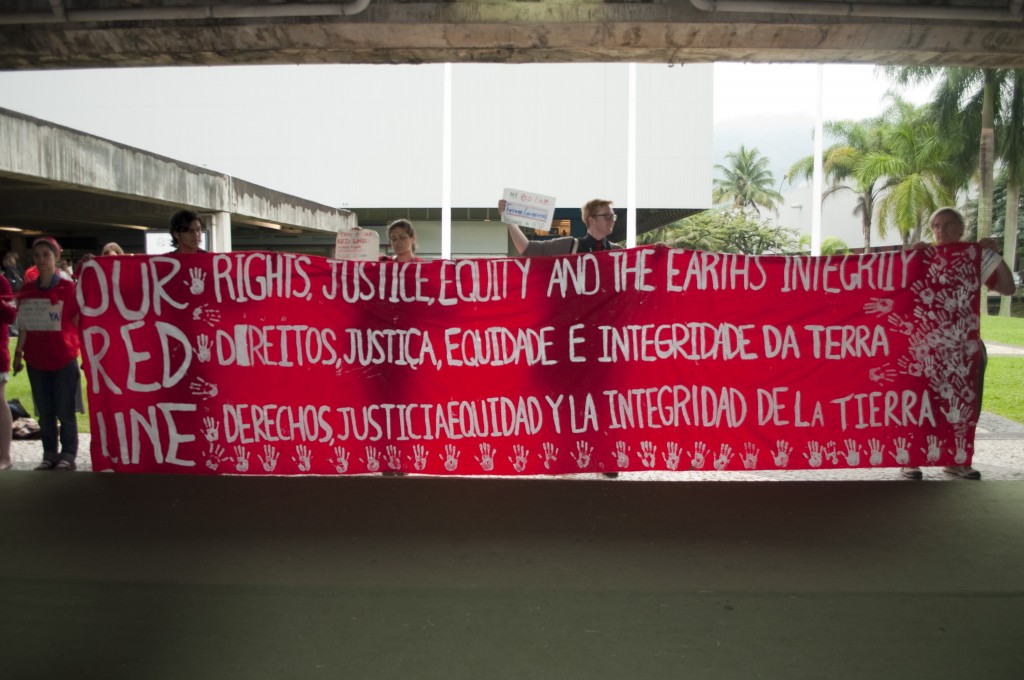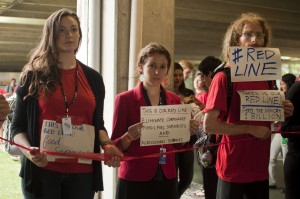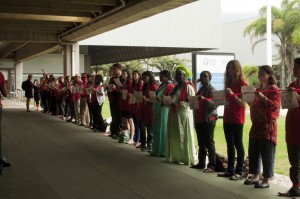By Julian Velez
Civil Society, represented by Major Groups (MGs) within the conference, could not come to an agreement — in informal consultations there where two attempts to create a united MG statement that fell apart because the perspectives of what was needed and the level of ambition that was required were very varied.
The organization of the conference here at Rio increased the confusion of the already disorganized civil society. With last minute changes in schedules, a paperless conference that sometimes had text but no electronic backup (and which civil society had no access to), and the constant closed bilateral meetings and informal negotiations alongside the Sustainable Development Dialogues, it was not till the looming end of the conference that everyone began to come together under one voice given the evidently unsatisfactory state of the negotiations.
Afterwards, there was a pretty much agreed text to present to heads of state and ministers for the three day high level summit, Rio+20. It was very clear that the big battles over language on the text were over and it was now a question of whether high representatives would endorse it. The text reflected compromises both from the developing and the developed nations but it failed to express ambition in eradicating poverty, in implementing sustainable development and in expressing true commitment to take action in the face of the environmental, social and economic crisis.
Seeing that the text was essentially locked down, a group of youth that felt the need to very clearly express that a political agreement does not necessarily mean something positive, and that in this case the outcome completely failed to meet what was needed from governments. Governments said: “we can live with this." The youth organized an action inside the convention center (Rio Centro) to say: “no, we cannot live with this, the people in the front lines of poverty, climate change and hunger cannot live with this." The youth, alongside some NGOs and other members of the major groups such as the Women and Indigenous major groups, raised their voice to say to governments, media and the rest of the world that Rio was a failure, that we cannot pat governments' backs for reaching a political agreement to continue the conversations in the multilateral process for another 20 years. To say that we need concrete commitments to actions, and that governments, especially in the developed world, have shaped their political agendas around the lobby of corporate interests and are taking steps backwards on previous commitments. Commitments that have not been met, commitments to support sustainable development in the developing world with Means Of Implementation (MOI), through public initiatives of tech transfer, capacity building and finance. It is more than clear that if the developed world does not help the developing nations and if they don’t recognize their historical responsibility and follow through with the corresponding steps, sustainable development will not happen.
The actions within Rio Centro and the people outside in the People Summit helped shift the broader discourse that is very present in these international negotiations: That a political agreement means progress or success and that blocking or rejecting it for bad or lack of content is blocking progress. The general disappointment of civil society in their governments was evidence that even when governments reach consensus, it does not necessarily reflect the ambition that is required. On one side the governments in the developing world are pushing to avoid the Green economy initiatives that threaten to tie them to a new form of neoliberal dependence and on the other, developed nations push to avoid meeting their commitments of publicly financing the shift towards sustainable development with MOI.
Civil Society is left with a sour aftertaste of constantly fighting against something instead of having victories and taking steps forward. Rio+20 was supposed to deliver ambitious solutions to the problems of the world. We were all fearfully expecting a Rio-20, but we are left with a general sentiment of a tasteless text form the multilateral process that barely achieved incremental progress: What we have a is Rio+0 non-win that wasted this unique opportunity for governments to change the course of the boat in time and allows the continuous of the ever drowning condition of those below deck.





